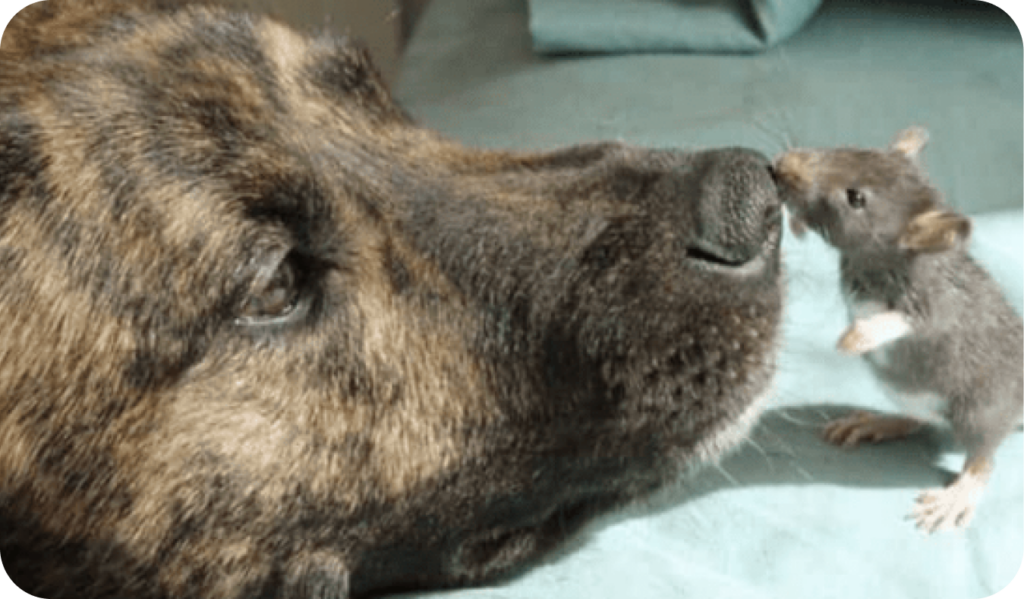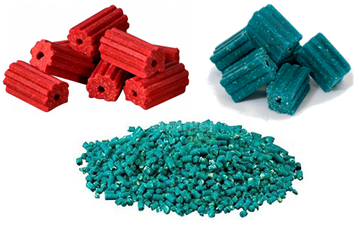Client Resources
Rat Bait (Rodenticide) Toxicity

Wild rats and mice are a household problem for many of us. Baits are commonly left in strategic places to reduce the population, but if they are left in places that our beloved pets have access to them serious health risks can occur. Rodenticides are chemical and compounds that affect blood clotting once ingested. They come in forms such as pellets or blocks, and are often brightly coloured. Common colours are green, blue or red. Rodenticide toxicity is common in dogs, as they seem to find the formulations surprisingly tasty! Cats sometimes eat the baits as well, although not as commonly as dogs.
There are many types of rodenticide, but they all cause similar effects. Rodenticides block the action of the enzyme that regenerates Vitamin K. Vitamin K is a key factor in producing some of the clotting factors in the ‘clotting cascade’.

The signs of rodenticide toxicity can range from very subtle changes early in the disease, to very drastic events. Some people first notice changes in their pets faeces, as they can appear blue or green from the pigment in the baits (depending on the type of bait eaten). Other signs can be fresh blood in faeces, blood in urine, a cough or lethargic behaviour. In severe cases, the animal can collapse, cough up blood, have difficultly breathing, or vomit blood. Some cases can present with a distended abdomen or painful abdomen. Often their gums will appear pale pink or white.
A thorough history from the owner and complete physical examination is critical when considering if rodenticide toxicity is likely, as many other diseases can appear similar. A blood clotting time is performed to determine if certain parts of the clotting cascade are normal or not. An assessment of red blood cell volume is made, along with an assessment of total blood protein levels and platelets. Other assessments may be made through other blood tests to determine if other diseases are involved such as liver disease or muscle trauma.
The type of treatment strongly depends on how long ago the animal ate the bait, and what kind of signs they presented with. Some owners are lucky enough to catch their pets in the act of eating the bait, meaning that treatment is more preventative. If the animal has eaten the bait less than an hour ago, then giving an injection to cause the animal to vomit will minimise the amount of toxin they absorb. A small amount of toxin may still be absorbed, so often treatment with Vitamin K tablets is recommended regardless of long ago the animal ate the bait.
If rodenticide ingestion has gone unnoticed and the animal presents with an acute bleeding disorder, then treatment becomes more aggressive. While Vitamin K treatment is still the main part of treatment, other things like intravenous fluid therapy, plasma transfusions, and whole blood transfusions may be involved. Acute bleeding disorders due to rodenticide toxicity are an emergency and often result in the animal being hospitalised for several days. Overnight care at a 24-hour facility may be recommended.
Following the package labels, and taking measures at home to minimise exposure of animals (and children) to rodenticides is important. Ensure that they are out of reach for animals and children, even when they are not being used and are stored. Keep a watch out for poisoned rodents and remove them as you find them to minimise the risk of your pet eating a poisoned rodent. Secondary toxicities are unlikely but are possible with some rodenticides. Even if you don’t use rodenticides on your property, neighbours might and poisoned rodents can make their way on your property.
Also, consider whether there are other ways for you reduce pest populations around your house and property that doesn’t require the use of rodenticides.

